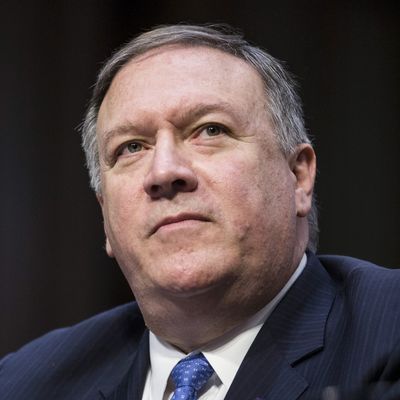
Since President Trump announced his intention to meet North Korean leader Kim Jong-un back in March, many doubted that the meeting would actually take place. But the odds seemed to increase on Tuesday when Trump claimed, “We have had direct talks at very high levels, extremely high levels.”
Experts speculated that he might be referring to contact between North Korean intelligence officials and some senior CIA officials, but it seems they weren’t thinking big enough. On Tuesday night, the Washington Post reported that CIA Director Mike Pompeo secretly visited North Korea over Easter weekend and met with Kim Jong-un. The purpose was to lay the groundwork for Trump’s talks with Kim, which are expected to take place in early June, or possibly even sooner.
The report has not yet been confirmed by the White House, the CIA, or the North Korean mission to the United Nations, which has been the main conduit for communications between Washington and Pyongyang. But there were signs that a new communications channel had opened in recent weeks. About a week after Pompeo’s trip, U.S. officials said they’d received confirmation from North Korea’s government that Kim is willing to discuss his nuclear weapons program with Trump.
Pompeo’s visit is the highest-level meeting between the U.S. and North Korea since 2000, when then-Secretary of State Madeleine Albright met Kim Jong-il, the current leader’s father. Pompeo has been nominated to be the next secretary of State, but the Senate is still debating whether he should be confirmed. With Republican senator Rand Paul and most Democrats on the Foreign Relations Committee planning to oppose his nomination, it appears Pompeo will be the first nominee in recent memory to be confirmed by the full Senate despite receiving an unfavorable vote in committee.
When Trump fired Secretary of State Rex Tillerson on March 13, four days after agreeing to a meeting with Kim, White House officials said he wanted to have his new national security team in place before the summit. But the Pompeo-Kim meeting underscores that Trump isn’t particularly concerned about following proper Senate or diplomatic procedures.
The State Department was sidelined during Tillerson’s tenure, and days after Pompeo’s nomination, the New York Times reported that he was already the primary player in planning Trump’s meeting with Kim. Thanks to the CIA director’s influence, the White House relied on intelligence rather than diplomatic channels in its early communications with the North Koreans:
Mr. Pompeo, these officials said, has already been dealing with North Korean representatives through a channel that runs between the C.I.A. and its North Korean counterpart, the Reconnaissance General Bureau. And he has been in close touch with the director of South Korea’s National Intelligence Service, Suh Hoon, who American officials said brokered Mr. Kim’s invitation to Mr. Trump.
Usually, a meeting between Trump and Kim would come after months of careful negotiations between lower-level diplomatic staffers (and the U.S. would not be operating without a special envoy to North Korea or an ambassador to South Korea). However, it seems Trump is putting more faith in his own dubious deal-making skills.
When Senator Jeff Flake raised concerns about this during Pompeo’s confirmation hearing, Pompeo suggested Trump was indeed trying a different method. He also assured him that preparations are underway — without disclosing that he’d personally met with Kim less than two weeks ago:
POMPEO: Senator, there – there is work being done today in preparation for the president’s proposed meeting with Kim Jong-un so American people you should know that there’s work being done in preparation for that.
The president’s view has been, and I agree with him, that the model we have used previously, long negotiations to get the two leaders to the table, hasn’t happened. We haven’t had that opportunity to have these two leaders to sit together to try to resolve this incredible, vexing, difficult challenge.
Since Trump appears to be taking a top-down approach to the Kim summit, it makes sense that he’d dispatch one of his favorite advisers to North Korea rather than relying on diplomatic staffers he’s shown little regard for. But in addition to further alienating the State Department, sending the CIA director to North Korea renders the Senate’s objections to his nomination moot.
During his confirmation hearing, Pompeo described the Trump-Kim meeting as an opportunity to “set us down the course of achieving a diplomatic outcome that America so desperately — America and the world so desperately need.” However, he also noted that “no one is under any illusions” that the summit will result in a “comprehensive agreement.”
When asked if he thinks Kim would actually dismantle his nuclear weapons program, Pompeo said “the historic analysis there is not optimistic.” Later he said that while he’d prefer a diplomatic solution, he could envision a scenario where a U.S. ground invasion of North Korea would be warranted.
These answers did little to change the opinion of the senators already leaning against endorsing Pompeo’s confirmation. “I sense a certain disdain for diplomacy in Mike Pompeo that I believe disqualifies him from being our next senior diplomat,” explained Senator Dianne Feinstein.
But in light of Pompeo’s reported meeting with Kim, what’s the point of making a stand against confirming him for secretary of State? Trump has him essentially doing the job before the Senate’s weighed in.






























